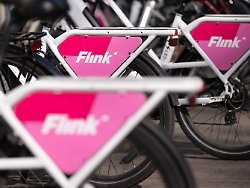Profitability instead of expansion
Lightning delivery services slow down
04/13/2022 1:51 p.m
So far, investors have willingly put their money into lightning-fast delivery services such as Gorillas or Flink. But a lot has changed in the meantime. Many companies are currently suspending their financing rounds. Instead of aggressive expansion, the focus is now on being in the black.
Their backpacks and bags are black, purple-yellow or pink and they race through Berlin, London and New York on bicycles and electric scooters. Fast delivery services such as Gorillas, Getir or Flink compete for the attention of customers who want groceries delivered by couriers in the shortest possible time. To do this, they need fast drivers, many small camps and good apps with interesting offers. That devours millions, which investors have so far readily made available because of the growth prospects.
But a lot has changed: food delivery services are no longer the stock market darlings they used to be. With the expected rate hikes by the central banks, capital will no longer be so cheap; high inflation and the war in Ukraine are dampening the economy. The billionaire startups need to rethink and adapt their aggressive expansion strategies. “We are now focusing on the existing markets, also in order to achieve profitability,” says Gorillas CFO Elmar Broscheit.
Analyst Clément Genelot from the investment bank Bryan, Garnier & Co. describes the new strategy almost all companies are currently postponing their financing rounds and laying off staff in order to get a grip on costs and gain time. He justifies the development with increasing doubts that the breakeven point will ever be reached and the concern that current valuations are already too high.
In order to get into the black at all, customers would have to spend more money per order, increase delivery fees and improve the utilization of individual locations, according to the experts from the consulting firm Alvarez & Marsal.
Getir does not have to worry about missing money
One of the services that has already had to draw conclusions from the cost dilemma is Jokr. The Berlin startup has turned its back on the Austrian and Polish markets and is concentrating on Latin America and the USA. “It was a question of focus,” says company boss Ralf Wenzel, who worked for the Japanese technology investor Softbank in the past. Jokr was only promoted to unicorn in December, later than Getir, Gorillas and Flink.
“The money from our most recent financing round has not been used up yet. There are still hundreds of millions outstanding,” says Wenzel. He doesn’t want to spend this wholeheartedly, but wants to point the way to the black figures because of the better cost structure in Latin America: “In Latin America we are already generating positive contribution margins. Our goal is to do this in two to three months, including the US business We’d be the first grocery delivery service to do that.”
Gorillas are also trying to get their cash burn under control. “We now want to make our core business, the warehouse, profitable. If we show that we are pursuing this rigorously, we will continue to have good access to capital,” says Broscheit, who worked for Macquarie for a long time, and last year the Entry of the Berlin Dax group Delivery Hero into Gorillas.
Getir from Turkey does not have to worry about a lack of money for the time being. The company only raised almost 770 million dollars from investors in mid-March and has since been valued at 12 billion dollars – about four times as much as Gorillas and Flink from Germany. But the company, which was founded in 2015 and describes itself as a pioneer in the fast delivery industry, now wants to take it slower. “This year we are focusing on growing in the markets where we are already present,” said European head Turancan Salur. Getir is currently active in nine countries – there are seven in Europe, Turkey and the USA. To extend its dominance in the UK, Getir took over rival Weezy, and Gorillas recently snapped up French express delivery service Frichti.
Niche providers want to benefit from development
Many experts are assuming that a wave of consolidation will roll in the medium term. According to Alvarez & Marsal, the large number of current providers will not be able to survive. However, analyst Genelot is certain that the fast delivery services will remain with us. During the Corona crisis, customers would have liked to have goods delivered as quickly and easily as possible.
Niche providers such as the delivery service for halal food, GetHalal, or pharmacy delivery services such as Mayd also want to benefit from this development. Mayd company boss and founder Hanno Heintzenberg, who previously set up the real estate agent McMakler, even sees himself at an advantage: “We have two levers that we can use to become profitable. The shopping cart and the efficiency of the drivers. In contrast to We don’t have any warehouses or perishable goods for gorillas, nimble and the like. We can also work well with time windows, which helps with capacity utilization. Medicines are also not heavy, which is why several deliveries fit into one backpack.”
